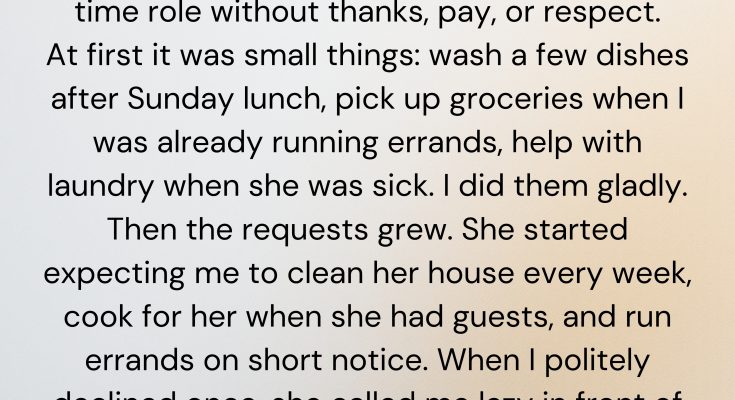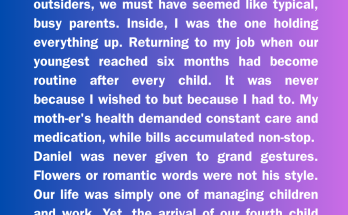When My Mother-in-Law Expected Me to Be Her Maid
I remember the first time my mother-in-law asked me to help with her housework, she framed it as a favor. I said yes because I wanted to be kind and because I believed marriage meant supporting family. I didn’t realize “a favor” would become my full-time role without thanks, pay, or respect.
At first it was small things: wash a few dishes after Sunday lunch, pick up groceries when I was already running errands, help with laundry when she was sick. I did them gladly. Then the requests grew. She started expecting me to clean her house every week, cook for her when she had guests, and run errands on short notice. When I politely declined once, she called me lazy in front of my husband. He shrugged and said, “She’s old; she needs help.” I felt squeezed between loyalty and humiliation.
The breaking point came on a holiday when she invited the whole family and then handed me a list of chores with a tone that made it clear I was the unpaid staff. I stood in the kitchen, hands raw from hours of work, while everyone else laughed and ate. I realized I had been performing emotional labor and domestic labor that no one acknowledged.
That night I made a decision. I would not be her free maid anymore, but I also didn’t want to start a war. The next morning I sat my husband down and spoke calmly. I told him how I felt, gave concrete examples, and asked for his support. I asked him to choose between letting this continue and helping me set boundaries. He was uncomfortable, but he agreed to back me up.
Then I did something practical: I proposed a household agreement. I wrote down who would do which chores, how often, and what help would look like when his mother visited. I suggested hiring a cleaner for heavy tasks and offered to help coordinate, not to be the default worker. When I presented the plan to my mother-in-law, she scoffed at first, but seeing my husband stand beside me changed the tone. She realized this wasn’t a personal attack; it was a request for fairness.
It wasn’t instant harmony. There were tense days and a few sharp words. But over time, the expectations shifted. We hired a cleaner for the heavy work, my husband started taking on more household tasks, and I stopped apologizing for saying no. The biggest change was that I stopped shrinking to fit someone else’s idea of duty.
I learned that kindness doesn’t mean being a doormat, and that setting boundaries can protect relationships instead of destroying them. My mother-in-law never became my best friend, but she learned to ask instead of assume, and I learned how to ask for respect.

